Filter by
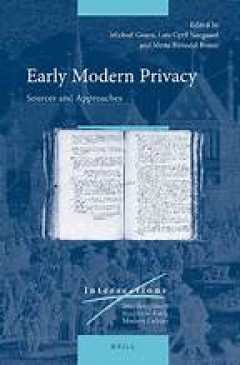
Early Modern Privacy Sources and Approaches
Privacy is often considered a modern phenomenon. Early Modern Privacy: Sources and Approaches challenges this view. This collection examines instances, experiences, and spaces of early modern privacy, and opens new avenues to understanding the structures and dynamics that shape early modern societies. Scholars of architectural history, art history, church history, economic history, gender histo…
- Edition
- -
- ISBN/ISSN
- 978-90-04-15307-3
- Collation
- oer.unej.ac.id
- Series Title
- Intersections, Volume: 78
- Call Number
- -
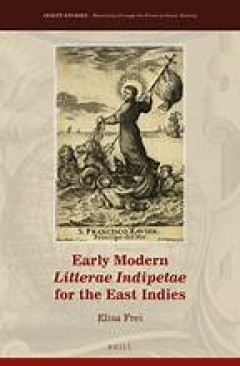
Early Modern Litterae Indipetae for the East Indies
During the early modern period, thousands of Jesuits across Europe wrote individual applications for appointments in the “Indies” directly to the superior general of the Society of Jesus in Rome. Known today as litterae indipetae (from Indias petere, that is, applying for the missions in the Eastern and Western territories), these letters encompassed the most personal desires, hopes, and dr…
- Edition
- -
- ISBN/ISSN
- 978-90-04-53801-6
- Collation
- oer.unej.ac.id
- Series Title
- Jesuit Studies, Volume: 40
- Call Number
- -

Domestic Devotions in the Early Modern World
This volume sets out to explore the world of domestic devotions and is premised on the assumption that the home was a central space of religious practice and experience throughout the early modern world. The contributions to this book, which deal with themes dating from the fifteenth to the eighteenth century, tell of the intimate relationship between humans and the sacred within the walls of t…
- Edition
- -
- ISBN/ISSN
- 978-90-04-37588-8
- Collation
- oer.unej.ac.id
- Series Title
- Intersections, Volume: 59/2
- Call Number
- -
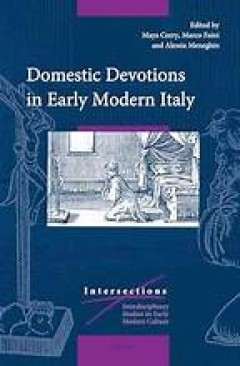
Domestic Devotions in Early Modern Italy
Domestic Devotions in Early Modern Italy illuminates the vibrancy of spiritual beliefs and practices which profoundly shaped family life in this era. Scholarship on Catholicism has tended to focus on institutions, but the home was the site of religious instruction and reading, prayer and meditation, communal worship, multi-sensory devotions, contemplation of religious images and the performance…
- Edition
- -
- ISBN/ISSN
- 978-90-04-37587-1
- Collation
- oer.unej.ac.id
- Series Title
- Intersections, Volume: 59/1
- Call Number
- -

Everyday Welfare in Modern British History : Experience, Expertise and Activism
This open access book offers a new approach to understandings of welfare in modern Britain. Foregrounding the agency individuals and groups claimed through experiential expertise, it traces deep connections between personal experience, welfare, and activism across diverse settings in modern Britain. The experiential experts studied in this collection include women, students, children, women who…
- Edition
- 1
- ISBN/ISSN
- 9783031649875
- Collation
- XV, 381 hlm,: ill, lamp;
- Series Title
- -
- Call Number
- -

The Quest for an Appropriate Past in Literature, Art and Architecture
This volume explores the various strategies by which appropriate pasts were construed in scholarship, literature, art, and architecture in order to create “national”, regional, or local identities in late medieval and early modern Europe. Because authority was based on lineage, political and territorial claims were underpinned by historical arguments, either true or otherwise. Literature, s…
- Edition
- -
- ISBN/ISSN
- 9789004378216
- Collation
- 820 hlm; ill., lamp.,
- Series Title
- Intersections, Volume: 60
- Call Number
- -

The Production of Knowledge of Normativity in the Age of the Printing Press =…
This volume explores the production of knowledge of normativity in the age of early modern globalisation by looking at an extraordinarily pragmatic and normative book: Manual de Confessores, by the Spanish canon law professor Martín de Azpilcueta (1492-1586). Intertwining expertise, methods, and questions of legal history and book history, this book follows the actors and analyses the factors …
- Edition
- -
- ISBN/ISSN
- 9789004687042
- Collation
- 452 hlm; ill., lamp.,
- Series Title
- Max Planck Studies in Global Legal History of the Iberian Worlds, Volume: 4
- Call Number
- -

The Lead Books of the Sacromonte and the Parchment of the Torre Turpiana: Gra…
The Archive of the Sacromonte Abbey in Granada preserves a historical treasure: Arabic texts on a sheet of parchment and on numerous small tablets of lead, which were discovered in Granada at the end of the sixteenth century in the tower of the old Friday Mosque and in caves of the "Valparaíso" hillock, from then on called "Sacromonte". They became the object of heated discussions in Europe an…
- Edition
- -
- ISBN/ISSN
- 9789004685277
- Collation
- 617 hlm; ill., lamp.,
- Series Title
- Texts and Sources in the History of Religions
- Call Number
- -
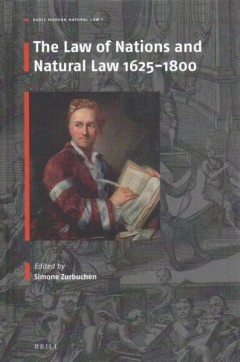
The Law of Nations and Natural Law 1625–1800
The Law of Nations and Natural Law 1625-1800 offers innovative studies on the development of the law of nations after the Peace of Westphalia. This period was decisive for the origin and constitution of the discipline which eventually emancipated itself from natural law and became modern international law. A specialist on the law of nations in the Swiss context and on its major figure, Emer …
- Edition
- -
- ISBN/ISSN
- 9789004384200
- Collation
- 348 hlm; ill., lamp.,
- Series Title
- Early Modern Natural Law: Studies & Sources
- Call Number
- -
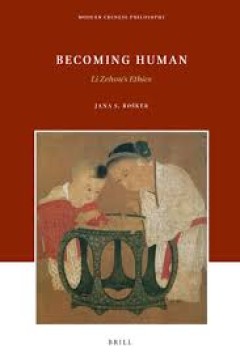
Becoming Human: Li Zehou's Ethics
The book Becoming Human: Li Zehou’s Ethics offers a critical introduction and in-depth analysis of Li Zehou’s moral philosophy and ethics. Li Zehou, who is one of the most influential contemporary Chinese philosophers, believes that ethics is the most important philosophical discipline. He aims to revive, modernize, develop, and complement Chinese traditional ethics through what he calls �…
- Edition
- Volume: 20
- ISBN/ISSN
- 978-90-04-42366-4
- Collation
- -
- Series Title
- -
- Call Number
- -
 Computer Science, Information & General Works
Computer Science, Information & General Works  Philosophy & Psychology
Philosophy & Psychology  Religion
Religion  Social Sciences
Social Sciences  Language
Language  Pure Science
Pure Science  Applied Sciences
Applied Sciences  Art & Recreation
Art & Recreation  Literature
Literature  History & Geography
History & Geography